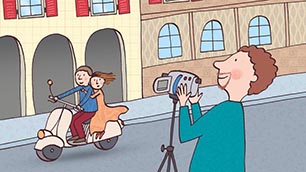| Silvia: | Connor, before we get to our nuova espressione idiomatica, let’s go over the espressioni that you already know. |
| Connor: | C’è Mamma mia, for example. And then ci sono the espressioni which use numeri! |
| Silvia: | Could you pick a couple of them and put them into context? |
| Connor: | I am going to fare quattro chiacchiere with Mr. Mark about his cinema, but ho paura. |
| Silvia: | That’s more than great, Connor! This is absolutely excellent! So, as you can imagine, in italiano abbiamo una miriade of this funny piccole espressioni. Oggi we’ll get to know the expression “in bocca al lupo”, which is how we wish someone buona fortuna in italiano. |
| Connor: | In bocca al lupo. What does that mean exactly? |
| Silvia: | In the mouth of the wolf! |
| Connor: | What? |
| Silvia: | Mouth means bocca and wolf means lupo. |
| Connor: | You’re scaring me now... essere in the bocca of the lupo, I mean, you need molta buona fortuna, ho ragione? |
| Silvia: | Sì, hai ragione, c’è bisogno di fortuna! Would you like me to tell you the whole story? |
| Connor: | È una cosa scary again? |
| Silvia: | Well... I’ll let you be the judge of that! We say “crepi il lupo”! A literal translation for that would be “may the wolf die”… although its English equivalent would be “knock on wood”. |
| Connor: | Voi avete una rough way to say knock on wood, Silvia! |
| Silvia: | Well, if somebody says to you “in bocca al lupo” you are not supposed to answer grazie. If you do, people will look at you in a very strange way, they will be puzzled... |
| Connor: | You can’t be serious! |
| Silvia: | Davvero, caro Connor. Concepts such as fortuna e sfortuna sono molto importanti in a country filled with little superstitious rituals, such as Italy! |
| Connor: | Good to know, Silvia. I’ll be careful not to make mistakes once I get there! |
| Silvia: | Let’s practice a little. In bocca al lupo for your appuntamento! |
| Connor: | Crepi il lupo, Silvia! |
| Silvia: | That was easy, wasn’t it? |
| Connor: | Sì, but ho paura I won’t be persuasive enough. |
| Silvia: | You mean, during the appuntamento? |
| Connor: | Sì! My sogno è tanto grande... if I get distracted dreaming about it, the wolf, the lupo will eat me! Just playing with parole... but, well... who knows... |
| Silvia: | And the lupo would be Mr. Mark, I’m guessing. Lui ha bisogno di sell the cinema... Sono sicura that he doesn’t want to fall in the bocca of the lupo either. And to him, tu sei the lupo! |
| Connor: | Io sono un lamb, Silvia! Ho una domanda. When would it be an appropriate time to say buona fortuna when you want to wish good luck to someone? |
| Silvia: | If you care about this person… NEVER! |
| Connor: | C’mon, Silvia! |
| Silvia: | It is considered impolite (and quite uncool) to wish someone good luck by saying buona fortuna. The socially acceptable way to wish buona fortuna è in bocca al lupo, which is the equivalent of the espressione inglese “break a leg”. |
| Connor: | OK, got it. |
| Silvia: | Bravo. Hai fretta, are you in a rush to go to the appuntamento? |
| Connor: | Sì, Silvia, un po’. |
| Silvia: | Non avere paura, OK? |
| Connor: | Hai ragione, Silvia! This will be my new mantra. Non ho paura! |
| Silvia: | In bocca al lupo, Connor! Alla prossima! |
| Connor: | Crepi il lupo, Silvia! Ciao! |





















